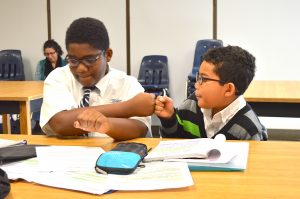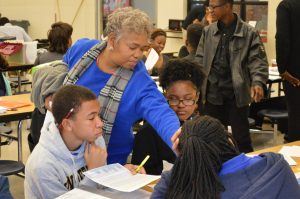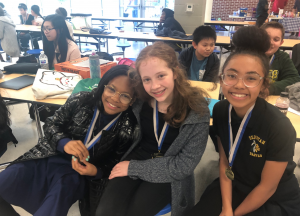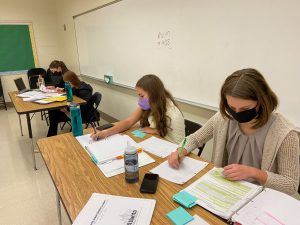By Christy Bradley and James Roland
As a nation, we are struggling to civically communicate with one another. Technology that has increasingly democratized access to information has also made it possible to ignore information that challenges our perspectives. Too often, we no longer question sources based on expertise or bias but instead engage in ad hominem attacks that are meant to denigrate those who appear different from us. It is easier than ever to find someone, somewhere, who shares our world view, and to participate in virtual tribalism with consequences that extend into the real world. We often cede our capacity for critical thinking to others, with no genuine commitment to understanding how or why a person might hold an outlook different from our own.
While classrooms have traditionally been a place of learning and inquiry, an increased awareness of the dynamics of classrooms, along with their hyper politicization, has suggested that we need a different forum in which to nurture the skills necessary for good civic communication. Given the ever-present nature of difference, fostering the ability to converse civilly, and in a manner that expands community capacity for deliberation and inclusive governance should be a priority. For thousands of young people across the United States, debate provides a foundation for civic engagement.
Debate is not a new activity, in fact, there is evidence of its existence in ancient societies. Formalized debate is somewhat more recent and likely has its roots in the early English debating societies of the Age of Enlightenment. Formal debate, as it exists now in the United States, is far more varied and accessible, in diversity of participation and thought, than at any point in its past. Much of this increased accessibility can be attributed to the development of urban debate in the 1980s. In cities such as Atlanta, Detroit, and Philadelphia, there was a growing recognition of the benefits of debate and concerns about inequitable access. The Detroit Public Debate League began in 1984 as an after-school partnership between the Detroit Gifted and Talented Program and Wayne State University.1 In Atlanta, a partnership between the Atlanta Public Schools and the Barkley Forum at Emory University formed in 1985 would accelerate access to debate for students from less resourced schools and result in the founding of the Atlanta Urban Debate League (AUDL) the nation’s oldest urban debate league.
Increased Access and Diversity
Melissa Maxcy Wade, then Director of Forensics at Emory University, was an early advocate of urban debate as a tool for ameliorating gaps in fundamental educational skills, such as reading and writing, for students from less resourced schools. Her passion for more equitable access to debate led to greater community investment in the activity. Early funding from Atlanta Public Schools, Phillips Petroleum Company, Gulton Foundation, and the Atlanta Bar Association created access to debate for more than 3,000 students by 1995.2 In recognition of the AUDL’s early success, The Open Society Institute invested $600,000 in the AUDL, using it as a template for the development of a similar program in New York City. As a result of seeding programs in other cities, often partnerships between school systems, private organizations, and universities, there are now 22 urban debate leagues in cities across the United States. The AUDL has continued to grow and is now comprised of more than 34 schools in 14 school districts across the state of Georgia. (The authors recognize that “urban” has often be used as a coded way of talking about minorities in the United States. In recognition of this, several members of the National Association of Urban Debate Leagues (NAUDL) do not have the word “urban” as a part of their name.)
 While there are many forms of debate, since its inception, the AUDL has been a champion of policy debate. Policy debate is a team event in which two teams, an affirmative and negative team, made up of two people each, debate the advantages and disadvantages of a policy action in front of a judge. The policy action is proposed by the affirmative team in support of a resolution, or call for change, that they must defend. The negative team presents disadvantages to the affirmative’s proposed plan, a counterplan, or reasons to prefer the status quo. Policy debate is a form of switch side debate and teams must switch between being the affirmative or negative team between rounds of debate. At the high school level, resolutions are determined by the National Federation of State High School Associations. The current and immediate past high school resolutions have been:
While there are many forms of debate, since its inception, the AUDL has been a champion of policy debate. Policy debate is a team event in which two teams, an affirmative and negative team, made up of two people each, debate the advantages and disadvantages of a policy action in front of a judge. The policy action is proposed by the affirmative team in support of a resolution, or call for change, that they must defend. The negative team presents disadvantages to the affirmative’s proposed plan, a counterplan, or reasons to prefer the status quo. Policy debate is a form of switch side debate and teams must switch between being the affirmative or negative team between rounds of debate. At the high school level, resolutions are determined by the National Federation of State High School Associations. The current and immediate past high school resolutions have been:
- 2020-2021: Resolved: The United States federal government should enact substantial criminal justice reform in the United States in one or more of the following areas: forensic science, policing, sentencing.
- 2021-2022: Resolved: The United States federal government should substantially increase its protection of water resources in the United States.
- 2022-2023: Resolved: The United States federal government should substantially increase its security cooperation with the North Atlantic Treaty Organization in one or more of the following areas: artificial intelligence, biotechnology, cybersecurity.
As is apparent from these topics, formal debate does not shy away from difficult, contentious, or challenging discussions. Instead, policy debate requires that young learners adopt and alternately defend a policy position that may not be their own. Policy debate necessitates that even if you don’t agree with a perspective, that you take time to understand it well enough to defend it. This forces a rigorous consideration of another person’s reasoning, as well as requiring self-reflection.
Over the past several decades, increased diversity in debate has led to greater diversity in argumentation and thought. In many communities, including the AUDL, students have used the national topic as a means of entry into discussions about public policy at the local level and in their own community. Most recently, the criminal justice reform and water resources topics have resulted in AUDL students convening local school and elected leaders about experiences in their own communities.
 Except at the open or varsity high school level, the AUDL is a closed-packet league. This means that all middle school students and most high school students use evidence generated by AUDL professional and intern staff to support their arguments and positions. The use of a closed packet is designed to moderate resource inequity in research development, so that coach educators can focus on helping students with their argument development and articulation. The AUDL is one of the only leagues in the country to have an elementary division. Students in the fourth and fifth grade alternate between a climate change and youth suffrage topic. In the elementary division, the focus is on understanding the difference between an opinion and an argument or a reasoned and evidentiarily supported line of thought.
Except at the open or varsity high school level, the AUDL is a closed-packet league. This means that all middle school students and most high school students use evidence generated by AUDL professional and intern staff to support their arguments and positions. The use of a closed packet is designed to moderate resource inequity in research development, so that coach educators can focus on helping students with their argument development and articulation. The AUDL is one of the only leagues in the country to have an elementary division. Students in the fourth and fifth grade alternate between a climate change and youth suffrage topic. In the elementary division, the focus is on understanding the difference between an opinion and an argument or a reasoned and evidentiarily supported line of thought.
Why Debate Matters
There are many academic programs designed to support the development of reading, writing, critical thinking, communication, and research skills. However, part of what makes debate unique is that it is a form of play, which generates a game-based learning environment. The playful and competitive aspects of debate simultaneously lower the bar to participation while increasing incentivization. The value of play as a learning tool stems not only from intrinsic motivators such as fun and curiosity, but also extrinsic motivators like rewards and tangible goals.3 
In “Competitive Speech and Debate: How Play Influenced American Educational Practice,” Michael Bartanen and Robert Littlefield argue that debate presents opportunities for “intellectual, social, and personal growth precisely because of the understanding that comes from the repetition of a speech or argument in a new and unique setting during each competitive round[.]”4 Furthermore, Bartanen and Littlefield suggest that the repetition and adaptation required by debate “encourages greater flexibility and the ability to apply competitively derived skills to a wide variety of situations.” 5 Debate, then, not only successfully teaches essential academic and life skills, but does so in a way that encourages students to adapt and apply those skills in different settings and contexts.
A ten-year retrospective study by Susannah Anderson and Briana Mezuk found that students who participated in policy debate through the Chicago Urban Debate League were more likely to graduate high school and less likely to drop out of high school compared to students who didn’t participate in debate.6 That same study also found that students who participated in policy debate scored significantly higher on every section of the ACT, particularly English and Reading, and were more likely to achieve the college-readiness benchmarks for the Writing, Science, and English sections of ACT than students who didn’t participate in debate. AUDL educators use debate to support an increasingly diverse set of students needs including serving as an outlet for gifted students at schools without formal programs, enrichment for students who don’t meet grade level reading standards and reading and speech practice for young English language learners. Of significance is that Anderson and Mezuk’s findings account for key predictors of academic performance including prior achievement, socioeconomic status, and special education status, and their results held true for students at higher and lower risk, regardless of the student’s race or gender.
The urban debate model is particularly well-suited for developing social and emotional learning skills. Debate practices and tournaments provide a significant and sustained opportunity for students to engage in low-risk socialization with their peers and adult mentors, in an engaging academic setting. In a second study in 2015, Anderson and Mezuk found that students who participated in debate reported significantly greater social conscience and social competence than students who did not participate in debate.7 Debate offers an opportunity for students of various and diverse backgrounds to engage in ways that would otherwise not be possible, with rules that structure and build respect for civil, civic engagement about social, political, and policy issues where difference is present.
Community Involvement
 Debate in the Atlanta Urban Debate League, as is the case for leagues across the country, is only made possible through the support of AUDL coaches, who serve as educators, teachers, and administrators in schools across the State of Georgia; and parents, who serve as students earliest educators and judges at AUDL tournaments. To keep barriers to participation in debate low, schools pay a nominal fee each year for membership in the AUDL which allows any student from their school to participate in AUDL tournaments, events, and programming. This increased access is made possible through ongoing grants and contributions of time and other resources from AUDL community members.
Debate in the Atlanta Urban Debate League, as is the case for leagues across the country, is only made possible through the support of AUDL coaches, who serve as educators, teachers, and administrators in schools across the State of Georgia; and parents, who serve as students earliest educators and judges at AUDL tournaments. To keep barriers to participation in debate low, schools pay a nominal fee each year for membership in the AUDL which allows any student from their school to participate in AUDL tournaments, events, and programming. This increased access is made possible through ongoing grants and contributions of time and other resources from AUDL community members.
Feedback from AUDL parents and coaches consistently supports the information produced from studies: students who participate in debate grow as individuals, both intellectually and emotionally, and are better prepared for civic engagement. The following examples of feedback from a survey of coaches at the end of the previous debate season underscore this observation:
Debate provides a fun, competitive (sic) environment where students are challenged to push themselves academically—and where they are rewarded if they do so as well. It pushes them to grow in their reading, writing, and speaking (sometimes, without them even realizing it!). It also provides a safe haven for them to meet on a weekly basis with other like-minded students and a coach who cares. We always have some friendly banter at the beginning of our meetings and are able to keep it light. I think the students enjoy both aspects of debate.
Debate teaches my students skills necessary to compromise and work with one another, even in difficult circumstances.
Once someone sees themselves a debater, and they have fun with it or experience some success, their confidence shoots up, and they identify themselves as clever and capable of critical conversations about current events. I see this happen with students all the time as students find out debate is “their thing.”
In 2V2 debate, Students have to work in pairs and often have to work with people they did not choose. In both 2v2 and1v1 debate, students have to relate well to total strangers, communicate respectfully with them, and persuade them to agree with their point of view. This builds crucial collaboration, teamwork, and empathy competencies.
The topics the past several years have been wonderful for students to build empathy and understanding of critical issues related to identity. This year was a deep dive into institutional racism in the criminal justice system. Last year looked at how U.S. arms policy fuels ethnic violence in other parts of the world. Two years ago we debated immigration policy and focused on empathy for the human beings who risk their lives to immigrate to the U.S. These are crucial, real-world topics that contextualize learning about real people and the impact policies have on their lives. This humanizing effect of learning about a current events topic is so rich in debate. (I could go on.)
Awareness for Debate is Growing
Speaking about her experience with debate in high school in 2017, Justice Ketanji Brown Jackson, the first black woman to serve on the U.S. Supreme Court said, “That was an experience that I can say without hesitation was the one activity that best prepared me for future success in law and in life.” She went on to say, “I learned how to reason and how to write…and I gained the self-confidence that can sometimes be quite difficult for women and minorities to learn at an early age.”8 As Justice Jackson and others continue to highlight the impact of debate on their early emotional, social, intellectual, and civic development, awareness for debate continues to grow. More than any other activity, debate fosters social and emotional learning, perspective taking, research and critical thinking, negotiation and respect for difference, and advocacy skills that are needed now as much as they have been at any point in our nation’s history. Like the National Civic League, the Atlanta Urban Debate League is committed to supporting youth civic engagement, and we believe that debate is one of the best possible foundations.
For more information, to get involved, or to donate, please visit https://www.atlantadebate.org/
Christy Bradley is Director of the Atlanta Urban Debate League & K-12 Engagement for Civic and Community Engagement at Emory University.
James Roland is Executive Director of the Atlanta Urban Debate League and Senior Executive Director for Civic and Community Engagement at Emory University.
1 Ziegellmueller, George. “The Detroit Experience,” Contemporary Argumentation and Debate 19 (1998): 85.
2 Our history. Atlanta Urban Debate League. (n.d.). Retrieved June 10, 2022, from https://www.atlantadebate.org/our-history
3 Gray, Peter. “The Value of Play I: The Definition of Play Gives Insights.” Psychology Today, 2008; Plass, Jan, Bruce Homer, & Charles Kinzer. “Foundations of Game-Based Learning.” Educational Psychologist, 2015.
4 Bartanen, Michael & Robert Littlefield. “Competitive Speech and Debate: How Play Influenced American Educational Practice.” American Journal of Play, volume 7, number 2, 2015.
5 Bartanen, Michael & Robert Littlefield. “Competitive Speech and Debate: How Play Influenced American Educational Practice.” American Journal of Play, volume 7, number 2, 2015.
6 Anderson, Susannah & Briana Mezuk. “Participating in a policy debate program and academic achievement among at-risk adolescents in an urban school district: 1997-2007.” Journal of Adolescence, 2012.
7 Anderson, Susannah & Briana Mezuk. “Positive Youth Development and Participation in an Urban Debate League: Results from Chicago Public Schools, 1997-2007.” The Journal of Negro Education, 2015.
8 Brown Jackson, Ketanji. “Reflections on My Journey as a Mother and a Judge.” Edith House Lectures, 35, 2 Mar. 2017, University of Georgia, School of Law. Lecture.



